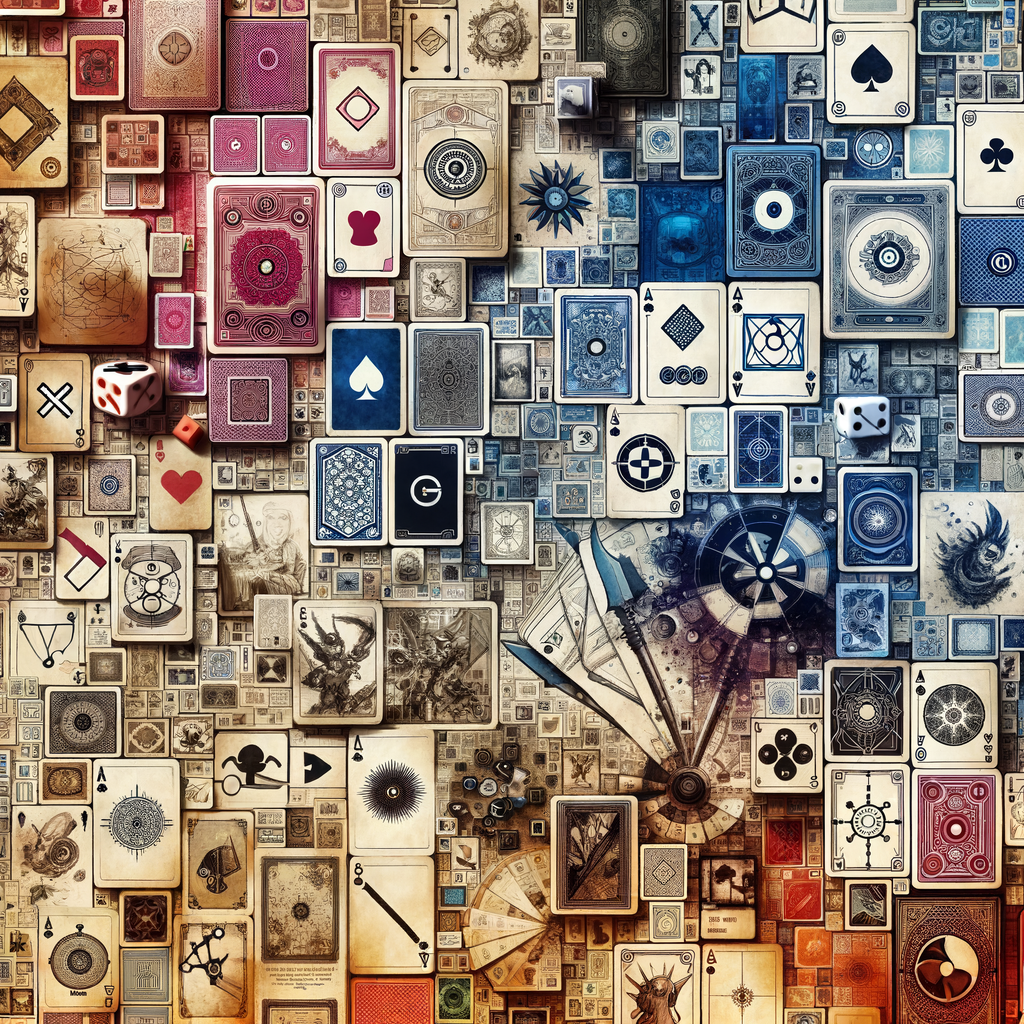Introduction to Board Games Components
Board games are a popular form of entertainment that can be enjoyed by people of all ages. They are not only fun, but they also stimulate our minds and encourage strategic thinking. The heart of every board game lies in its components. These elements play a crucial role in how the game is played and enjoyed.
- Definition and importance of board game components
Board game components are the physical elements that make up a board game. They can range from the game board itself to the pieces that players move, the cards they draw, and the dice they roll. These components are essential as they dictate the rules and objectives of the game. Without them, the game would not exist.
Components are also important because they add a tactile element to the game. They allow players to physically interact with the game, enhancing their overall gaming experience. Furthermore, well-designed components can make a game more appealing and engaging, attracting more players.
- Types of board game components
There are several types of board game components, each serving a different purpose. Here are a few common ones:
- Game Board: This is the main component of most board games. It serves as the playing field where the game takes place.
- Game Pieces: These are the objects that players move around the board. They can take various forms, such as tokens, pawns, or figurines.
- Cards: Many board games use cards to add an element of randomness or strategy. They can serve various functions, such as dictating player actions or providing resources.
- Dice: Dice are often used to determine movement or outcomes in a game. The roll of a die can add an element of chance to a game.
In conclusion, board game components are essential to the gameplay and overall experience of a board game. They dictate the rules, add a tactile element, and can even enhance the game’s appeal. Understanding these components can help you appreciate your favorite games even more.
The Versatile Board Game Cards
Board game cards are a versatile component that can add depth and strategy to any game. Let’s delve into their uses and some examples of card-based board games.
Use of Cards in Games
Cards in board games serve various roles, from dictating player actions to determining the game’s outcome. They can add a layer of unpredictability and excitement to the gameplay. Let’s explore this further.
Role of cards in game mechanics: Cards in board games can serve as the game’s engine, driving the gameplay forward. They can represent resources, actions, or objectives, and their use can greatly influence the game’s outcome. For instance, in the popular game Monopoly, the ‘Chance’ and ‘Community Chest’ cards can drastically alter a player’s fortune.
Examples of card-based board games: There are numerous board games that heavily rely on cards. Some examples include Dominion, a game where players acquire and use cards to gain points, and Uno, a fast-paced game where players aim to discard all their cards. Another example is Codenames, a team-based word game where players use one-word clues to identify their team’s cards.
As we can see, cards are an integral part of many board games, adding complexity and strategy to the gameplay. They are a versatile tool that can transform a simple game into an engaging and challenging experience.
Board Games Card Usage
Board game cards are an essential component that adds a layer of complexity and strategy to games. Let’s delve into how they do this and examine some popular board games as case studies.
How cards add complexity and strategy to games
Cards in board games are not just about luck; they add a significant strategic element. Each card has a specific role, and players must decide when and how to use them for maximum effect. This decision-making process adds complexity to the game, making it more engaging and challenging.
For example, in a game like Monopoly, the “Chance” and “Community Chest” cards can dramatically alter the course of the game. Players must decide when to use these cards to their advantage, adding a layer of strategy to the game.
Case study: Card usage in popular board games
Let’s take a closer look at how cards are used in two popular board games: Settlers of Catan and Clue.
| Game | Card Usage |
|---|---|
| Settlers of Catan | In Settlers of Catan, cards represent resources like wood, brick, wheat, sheep, and ore. Players use these cards to build roads, settlements, and cities. The strategic use of these cards is crucial to winning the game. |
| Clue | In Clue, cards represent the potential murder suspects, weapons, and rooms. Players use these cards to deduce who the murderer is. The game requires strategic card usage and deduction skills. |
As seen in these examples, cards add a significant strategic and complex element to board games, making them more engaging and enjoyable.
Card-based Board Games
Card-based board games are a popular form of entertainment that combines the strategic elements of board games with the versatility of cards. Let’s delve into the world of board game design, particularly focusing on the role of cards.
Board Game Design
Designing a board game is a complex process that requires a deep understanding of gameplay mechanics, player interaction, and visual aesthetics. A key component of this design process is the creation of game cards.
- Importance of card design in board games
The design of game cards is crucial in card-based board games. Not only do they serve as a medium for players to interact with the game, but they also contribute to the overall aesthetic appeal of the game. A well-designed card can enhance the player’s experience, making the game more engaging and enjoyable. For instance, in the popular card-based board game Magic: The Gathering, the intricate card designs add to the game’s fantasy theme and help immerse players in the game world.
- How card design influences gameplay
Card design can significantly influence gameplay in card-based board games. The information and symbols on a card dictate its function within the game, affecting the strategies that players can employ. For example, in the game Dominion, the variety of card designs allows for numerous possible strategies, making each game unique. Additionally, the visual design of a card can influence a player’s decision-making process. A visually appealing card might be chosen more often than a less attractive one, even if the latter has a better strategic value.
In conclusion, card design plays a vital role in card-based board games. It not only enhances the aesthetic appeal of the game but also influences the gameplay, making each game a unique experience.
Importance of Cards in Board Games
Board games are a popular form of entertainment that brings people together. One of the key components of many board games is the use of cards. But why are cards so important in board games? Let’s explore this further.
The strategic value of cards
Cards play a significant role in adding a strategic element to board games. They can be used to introduce randomness, challenge, and unpredictability, making the game more exciting and engaging. For example, in the game Monopoly, the ‘Chance’ and ‘Community Chest’ cards can drastically change the course of the game, adding an element of surprise and strategy. This strategic value of cards enhances the overall gaming experience, making it more enjoyable and competitive.
How cards enhance player interaction
Cards also enhance player interaction in board games. They can act as a tool for communication, negotiation, and even conflict between players. For instance, in the game Settlers of Catan, players can trade resource cards with each other, fostering negotiation and interaction. This not only makes the game more social and interactive but also adds another layer of strategy as players must decide when and with whom to trade. Thus, cards can significantly enhance player interaction in board games.
In conclusion, cards are a crucial component of many board games. They add a strategic value and enhance player interaction, making the game more exciting, engaging, and social. So, the next time you play a board game, take a moment to appreciate the role of cards in your gaming experience.
Strategy in Card-based Board Games
Card-based board games are a popular form of entertainment that combines strategy, luck, and skill. The cards used in these games are often the key to winning. Understanding the different types of cards and how they affect strategy can greatly enhance your gameplay.
Types of Cards in Board Games
Board games utilize a variety of card types, each with its own unique impact on the game’s strategy. Let’s take a closer look.
- Overview of different card types
There are several types of cards used in board games. Some of the most common include:
- Action Cards: These cards allow players to perform specific actions during their turn, such as moving pieces or drawing more cards.
- Resource Cards: These cards represent various resources that players can collect and use to build or trade.
- Event Cards: These cards trigger certain events or conditions in the game, often changing the game’s dynamics.
- How different card types affect strategy
The type of card can significantly influence a player’s strategy. For instance, action cards often require strategic timing to maximize their benefits. Resource cards may require players to balance their resource collection and usage carefully. Event cards, on the other hand, can introduce unexpected twists, requiring players to adapt their strategies on the fly.
In conclusion, understanding the different types of cards and how they impact strategy is crucial to mastering card-based board games. So, the next time you play, pay close attention to the cards and use them wisely to outsmart your opponents!
Board Game Card Mechanics
Board game card mechanics are the rules and methods that guide how cards are used in a game. They are the heart of many card-based board games, influencing how players interact with the game and each other. Let’s delve into these mechanics and understand how they shape the strategy of the game.
- Exploration of common card mechanics
There are several common card mechanics found in board games. Let’s explore a few of them:
- Drafting: In games with a drafting mechanic, players choose cards from a common pool to build their hands. An example of this is in the game 7 Wonders.
- Hand management: Some games require players to manage their hands effectively to win. They must decide which cards to keep, which to play, and when to play them. The game Ticket to Ride uses this mechanic.
- Set collection: In these games, players aim to collect sets of similar cards for points. Rummikub is a popular game that uses this mechanic.
- How card mechanics drive strategy
Card mechanics significantly influence the strategies players use in board games. Here’s how:
- Drafting: In drafting games, players must anticipate what cards other players might want and choose their cards accordingly. This adds a layer of strategy as players try to maximize their benefits while thwarting their opponents’ plans.
- Hand management: Games with a hand management mechanic require players to think ahead and plan their moves carefully. They must consider the potential outcomes of each card they play and how it will affect their overall strategy.
- Set collection: In set collection games, players must decide which sets to pursue based on the cards available and the potential points they can earn. This requires strategic decision-making and risk assessment.
In conclusion, card mechanics are a crucial aspect of card-based board games. They add depth and complexity to the game, making each play a unique and engaging experience. Understanding these mechanics can enhance your gaming experience and improve your strategic play.
Conclusion: The Game-Changing Power of Cards
As we wrap up our exploration of card-based board games, it’s clear that cards hold a significant, game-changing power. They are not just pieces of paper with images and text; they are the heart and soul of many board games, driving the narrative, strategy, and player engagement.
- Recap of the importance and versatility of cards in board games
Cards serve a multitude of purposes in board games. They can be used as a means of randomization, a way to introduce variability, or even as the primary components of the game. Their versatility allows game designers to craft unique and engaging experiences, from simple family games to complex strategic battles. The importance of cards in board games cannot be overstated. They are the backbone of many popular games, such as Magic: The Gathering and Dominion, demonstrating their enduring appeal and versatility.
- Future trends in card-based board games
Looking ahead, the future of card-based board games is bright. With advancements in technology, we can expect to see more hybrid games that combine physical cards with digital elements. Additionally, the trend of creating more diverse and inclusive games continues to grow, with game designers striving to represent a wider range of experiences and perspectives in their card designs. As the board game industry continues to evolve, the power of cards will undoubtedly remain a constant, continuing to shape the way we play and enjoy games.
In conclusion, the power of cards in board games is truly game-changing. They offer endless possibilities for game design and gameplay, making each game a unique experience. As we look to the future, we can only expect this trend to continue, with cards remaining a vital component in the world of board games.




